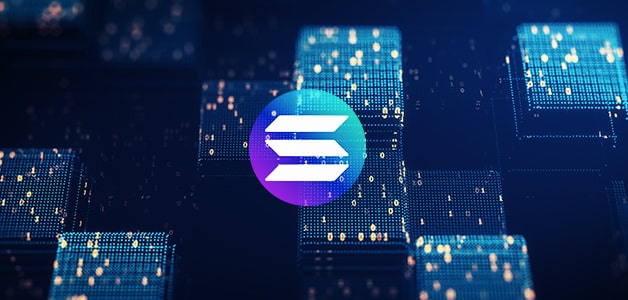-
Solana is an open-source blockchain platform known for its high scalability. In 2017, Anatoly Yakovenko and Raj Gokal designed this platform to overcome the shortcomings of Ethereum. Today, the platform is among the mostly used blockchains owing to its scalability. Its high transaction processing speed and low transaction costs make it a better alternative to the Ethereum blockchain. Explore more reasons and services to choose Solana blockchain development services in this blog:
Reasons to Select Solana Blockchain Development Over Others
Solana's founders developed it for energy efficiency, speed, high scalability, and more. Here is a list of all the reasons that make Solana stand apart from the crowd:
High Capacity and Security
Solana uses a unique Proof-of-History (PoH) consensus mechanism to validate blocks in the network. PoH can precisely organize transactions on the Solana blockchain. It creates timestamps of block formation and verifies the timespan between two transactions.
This consensus does not follow sequential block production. Instead, it lets transactions be processed as they come. In this way, Solana saves time and prevents unprecedented intrusions.
Minimum Network Congestion
Solana enables parallel runtime, allowing multiple processing simultaneously. Thus, its transaction engine can process many smart contracts concurrently.
This feature lets the blockchain support an increasing load of transactions within the network. Thereby, the network has high scalability leading to less network congestion.
Community-tested Programming Language
Rust programming language is the core of Solana blockchain development. It supports performance-critical services with no garbage collector or runtime.
This memory-efficient programming language can easily integrate with other programming languages. Thus, Rust enables smooth engineering of the blockchain.
Negligible Fees
Solana can quickly generate a block and accommodate up to 20,000 transactions in a single block. Thus, the platform charges low transaction fees as compared to Ethereum. The average cost per transaction on the blockchain network is $0.00025, providing long-term financial stability.
Eco-friendly
Conventional blockchains use a Proof-of-Work (PoW) consensus mechanism. It utilizes high computation power, which in turn requires high energy. It leads to a negative impact on the environment.
However, Solana uses PoH consensus, which does not need high energy for transaction validation. Thus, the network is eco-friendly.
Also, Check | Solana Pay | The New Payment Rail for Efficient Payment Solutions
Solana Blockchain Solutions
Businesses can opt for Solana blockchain development for the following services:
Solana DApps Development
Solana enables the development of powerful decentralized applications (dApps) for various use cases. The platform allows end-to-end development of dApps for various industries.
Solana-based dApps can easily trace transactions due to the distinct PoH consensus that maintains a historical record of events.
Rust adds transactional security, guaranteeing that no dApps using the Solana blockchain and token development will ever encounter downtime.
Some popular dApps on Solana are Phantom, Audius, Mango, Soland, and more.
Also, Read: Why to Choose Solana for dApp Development
Solana NFT Marketplace Development
Solana can easily connect with popular DeFi networks via a wormhole.
Here, a wormhole is a messaging bridge between Solana and other blockchains that helps to transfer tokenized assets.
Solana has affordable fees, interoperability, and affordable fees. Thus, Solana-based NFT marketplaces have high liquidity.
Solana does not face the problem of mempool settlement, which takes time in other blockchains.
It uses Gulf Stream, a mempool management system that lets users make up to 100,000 transactions. Thus, Solana enables swift NFT transactions in marketplaces.
Furthermore, the blockchain eliminates the issue of network congestion. These aspects of Solana make it ideal for NFT marketplace development.
Solana Smart Contract Development
Developers can use several programming languages to develop Solana smart contracts. Although Rust is the native language for Solana smart contracts, the protocol also enables smart contract development in C++ and Solidity. It also supports more languages via third-party JSON RPC API SDK clients.
When using languages other than Rust for smart contract development, developers must convert programs into Rust-compatible code using compilers like Solang. Neon EVM, which has an Ethereum compatibility layer, enables Solidity developers to design and deploy Ethereum smart contracts on Solana.
Furthermore, Solana uses Sealevel to execute smart contracts. Sealevel enables the developers to modify the blockchain with multiple smart contracts simultaneously.
Explore: Why You Should Develop a Smart Contract on Solana
Solana Token Development
Tokens developed on Solana do not encounter any bandwidth issues. Solana divides transactions into various task categories, known as pipelining. This process helps in quickly processing transactions.
Additionally, the blockchain divides nodes into smaller pockets as smaller information packets are simple and quick to transact.
Solana DeFi Development
Solana has developed an ecosystem for DeFi development. Businesses can build DeFi protocols that require high throughput at very low latencies on this ecosystem.
DeFi development consists of decentralized cryptocurrency exchanges and protocols that support trading, lending, and investment of crypto assets. The platform provides the development of asset management software, open-order book exchanges, and more.
Some examples of Solana DeFi are Orca, Drift Protocol, Jupiter Aggregator, Raydium, and more.
Also, Visit: Solana DeFi Development | Advantages and Applications
Solana Blockchain Development Process
Even though the Solana blockchain development process changes with the services, it follows a generalized route with minor differences. The following is a list of the main processes involved in the development process:

Why Choose Oodles
Oodles Blockchain can be your ideal partner for Solana blockchain development. We have extensive experience creating and building reliable blockchain solutions for companies across various industries.
Our seasoned and knowledgeable Solana blockchain development experts make it possible to showcase our ability to demonstrate our leadership in nurturing the enthusiast community.
Whether you want to go for Solana dApp development or marketplace development, our Solana experts can help you build multiple solutions. Connect with our Solana developers to discuss your project ideas.

Our Offices
INDIA
Emaar Digital Greens, Sector 61,
Gurugram, Haryana
122011.
Welldone Tech Park,
Sector 48, Sohna road,
Gurugram, Haryana
122018.















